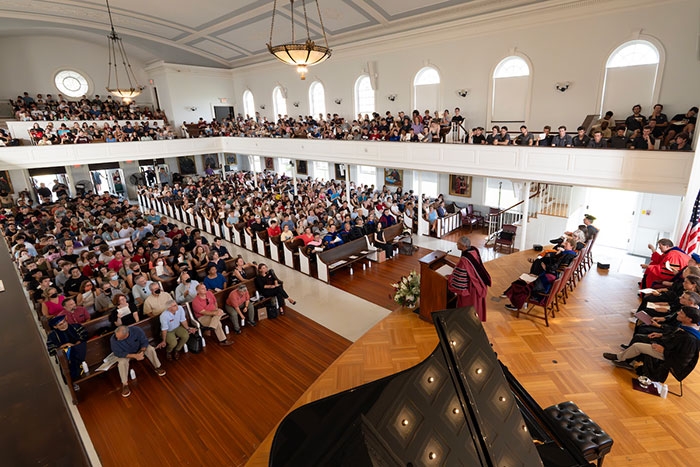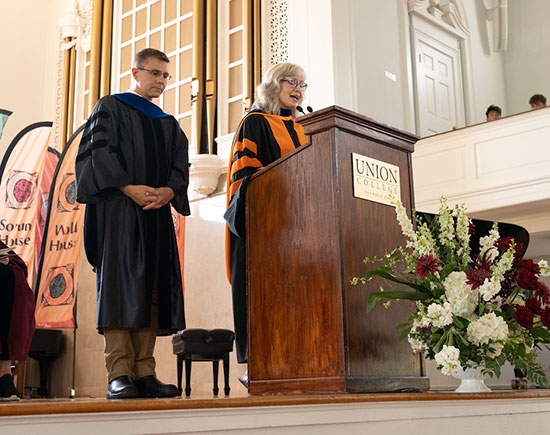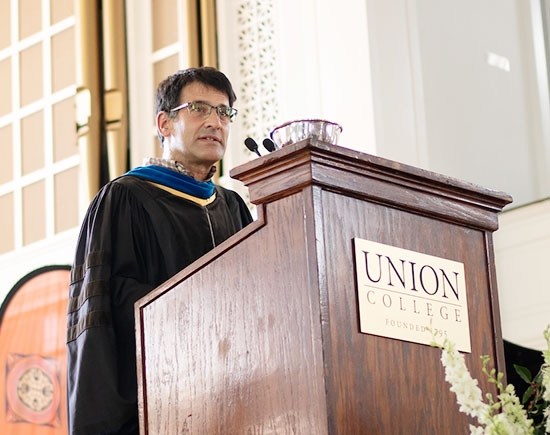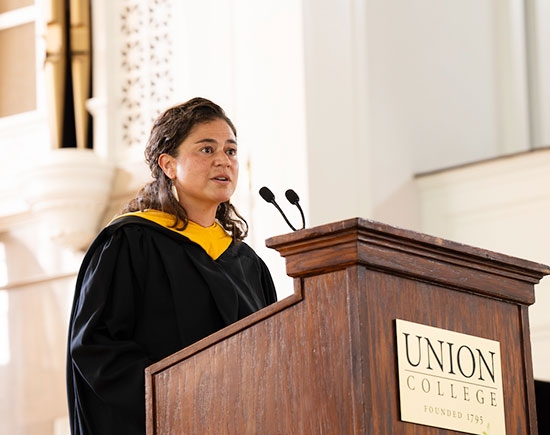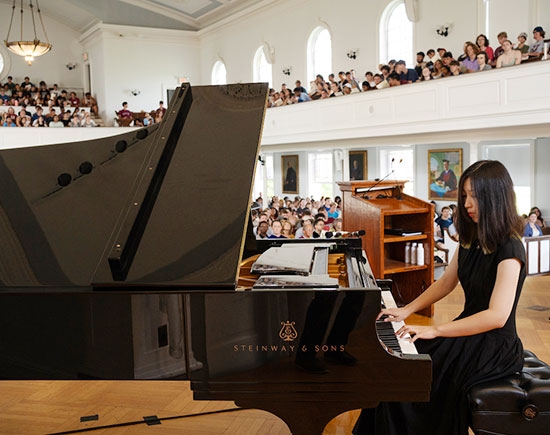Hundreds of first-year students joined faculty and other members of the campus community as the College officially launched its 229th academic year Tuesday afternoon during its annual Convocation ceremony.
“For the very first time at a public event, it is my pleasure to say, Welcome Union College Garnet Chargers,” President David R. Harris told the audience gathered in Memorial Chapel.
After an extensive process that involved a wide swath of constituents, Harris announced last month that the College had selected Garnet Chargers as its new nickname.
Harris welcomed the 560 students beginning their college journey as members of the Class of 2027. They were selected from nearly 9,500 applicants, a Union record. The students hail from 34 states and 25 countries.
Entering his sixth year as president, Harris focused on three themes for the coming year: generative artificial intelligence (AI), academic mission, and diversity, equity, inclusion and belonging (DEIB).
The AI revolution, accelerated in part by the launch last year of ChatGPT -- a free tool that lets people enter prompts and receive human-like text in return -- has forced colleges and universities to figure out how to navigate the new technology.
Noting the College’s closing phrase of its vision statement to develop “every student to lead with wisdom, empathy and courage, in ways large and small, now and across multiple tomorrows,” Harris said Union must lean into the ample opportunities offered by generative AI.
“I am confident that Union has the academic resources, culture and perspectives to prepare its students for this now-known tomorrow better than almost any other college or university,” he said.
He acknowledged the risks and challenges presented by generative AI, including concerns about whether tests and papers students submit will accurately reflect what they have learned and questions about who owns what GAI creates. He also noted concerns about how the rapid proliferation of GAI will impact labor markets and the well-being of people near and far.
He asserted that Union has positioned itself to thrive in the complex and evolving environment.
“With the combination of liberal arts and computer science and engineering, our students will contemplate the ethics and practical generations of generative AI from a holistic and interdisciplinary perspective while developing the skills expected from future employers,” he said.
The College’s new Templeton Institute, co-led by faculty from engineering and the humanities, will play an integral role in how Union can take advantage of the AI revolution.
The Institute has selected AI as its theme for the year.
“The Institute provides a distinctive structure for comprehensive discussions, programs and events ranging from how to replicate human thought to what it means to be human in the age of artificial intelligence," Harris said.
He said there will be more to come on the topic, including in course syllabi and campus messages.
“This must be the year we define and harness the power of Union in the Age of Generative AI,” he said.
The College will continue to advance its critical academic goals, Harris said. This includes a deeper and broader commitment to its engineering and computer science offerings, such as new faculty hires and programs. The College recently restored its civil engineering major and added a new environmental engineering major.
A new General Education curriculum also includes a requirement that every student take at least one course in engineering, technology and society, along with traditional courses in other areas.
“Given our range of offerings across humanities and arts, social sciences, sciences, and engineering and computer science, as well as our small size, there are few schools that can match our potential to prepare students for multiple tomorrows,” Harris said.
In the wake of this summer’s U.S. Supreme Court’s decision to strike down race-conscious admissions policies, Harris promised that the College will not “walk away from our commitment to recruiting, admitting, enrolling and educating the most exceptional students we can find from a range of backgrounds.”
The College will strengthen its efforts to tell the Union story to a diverse group of prospective students and help them understand why Union should be part of their story. The College has also introduced application essays that will allow students to share what they have faced, how they have responded, what they have learned and how they would enhance the community.
Harris reminded the audience that Union was founded in 1795 on a foundation of diversity of religious faiths. It was not until much later when women and people of color were welcomed. International students are a small part of the alumni population.
“What I can commit to you with every fiber of my being is that I will work with my team of administrators to identify and change any policies and practices that make it difficult for any member of this community to achieve their full potential because of how they self-identify or how they are defined by others,” Harris said.
He challenged the campus community to be “brothers and sisters every day,” and to appreciate that they are part of every other person’s experience.
Referencing a concept from the smash movie, “Barbie,” Harris said, “there are ways in which each of us sometimes lives in Mojo Dojo Casa House, and frankly, what we’re doing isn’t always enough. This will be the year that we can and we must do better.”
Also at Convocation, Michele Angrist, the Stephen J. and Diane K. Ciesinski Dean of Faculty and Vice President for Academic Affairs, presented the winners of the College’s top faculty awards.
Timothy Stablein, associate professor of sociology, was presented with the Stillman Prize for Faculty Excellence in Teaching. Stablein excels at engaging and challenging his students, making his classes an inclusive space where students feel comfortable speaking their minds as they explore topics relevant to their everyday lives. He has worked to abandon the traditional lecture/discussion format in favor of student-led presentations of class material, readings and discussions. Stablein joined the College in 2013.
Donald Rodbell, the John and Jane Wold Professor of Geosciences, was presented with the Stillman Prize for Faculty Excellence in Research. A prolific researcher, Rodbell has focused on finding climate records in sediment layers from high altitude lakes and in cave deposits in the tropical Andes. He recently led a team of researchers who have shown that glaciers in the tropical Andes mountains have been in sync with polar ice extent in Antarctica and the Arctic for nearly a million years. Their findings were published in Nature, the world’s leading journal of peer-reviewed science research. Rodbell joined Union in 1993.
Both faculty prizes were created by Abbott Stillman ‘69, David I. Stillman ’72 and Allan Stillman in honor of their father and grandfather, Abraham Stillman.
Also, Beth Tiffany, senior associate director of athletics, was presented with the UNITAS Community Building award. The UNITAS award is given in recognition of a person who has helped foster community and diversity at Union. Tiffany was honored for her work in a number of critical initiatives, including Title IX, DEIB and Women at Union.
The Hollander Convocation Music Prize was presented to Yutong Wu '25. Wu performed a beautiful rendition of Franz Liszt’s “Consolidation No. 2 in E major, S. 172.” The prize was established by the late Lawrence J. Hollander, dean of engineering emeritus.
Angrist also recognized the students who made the Dean’s List last year.
Convocation opened with remarks from College Marshal Stacie Raucci, the Frank Bailey Professor of Classics; Julie Swidler ‘79, the new chair of the Board of Trustees; Stephen Schmidt, the Kenneth B. Sharpe Professor of Economics and chair of the Faculty Executive Committee; and Lani Waggoner ‘24, Student Forum president.
An all-campus barbecue followed on Hull Plaza.
Fall term classes begin Wednesday, Sept. 6.
